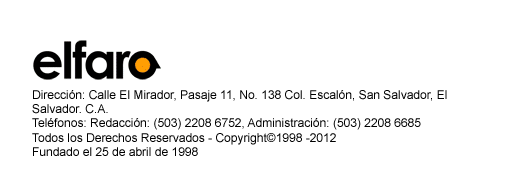EL SALVADOR: GOES FINALLY "GETTING IT" ON CRIME?
Publicado el 8 de Septiembre de 2011
id: 70174
date: 7/3/2006 18:04
refid: 06SANSALVADOR1702
origin: Embassy San Salvador
classification: CONFIDENTIAL
destination:
header:
VZCZCXYZ0020
PP RUEHWEB
DE RUEHSN #1702/01 1841804
ZNY CCCCC ZZH
P 031804Z JUL 06
FM AMEMBASSY SAN SALVADOR
TO RUEHC/SECSTATE WASHDC PRIORITY 3005
INFO RHEHNSC/NSC WASHINGTON DC PRIORITY
RHEFDIA/DIA WASHDC PRIORITY
RUEAHLC/HOMELAND SECURITY CENTER WASHINGTON DC PRIORITY
RUCNFB/FBI WASHDC PRIORITY
RUEAWJA/DEPT OF JUSTICE WASHINGTON DC PRIORITY
RUMIAAA/HQ USSOUTHCOM MIAMI FL PRIORITY
RUEHZA/WHA CENTRAL AMERICAN COLLECTIVE
----------------- header ends ----------------
C O N F I D E N T I A L SAN SALVADOR 001702
SIPDIS
SIPDIS
E.O. 12958: DECL: 07/02/2016
TAGS: EAID, ES, PGOV, PINR, PREL
SUBJECT: EL SALVADOR: GOES FINALLY "GETTING IT" ON CRIME?
Classified By: Ambassador H. Douglas Barclay, Reasons 1.4 (b) and (d)
1. (C) SUMMARY: Ambassador Barclay met June 27 with
President Tony Saca to underscore U.S. concern about El
Salvador's worsening crime problems; the President indicated
that he intends to make crime his number-one priority during
his remaining three years in office. A flurry of recent
activity in legal and judicial reform, together with the
recent dismissal of corrupt judges and police, appear to
indicate a newfound willingness on the part of goverment
authorities to face up to the reality of the nation's
critical crime problem. The Embassy stands poised to
integrate greater efforts with the GOES's anti-crime
struggle, while keeping the Saca administration focused on
the need for it to take the lead. END SUMMARY.
2. (C) In an hour-long June 27 meeting with President Saca,
Ambassador Barclay emphasized the importance the USG places
on addressing the nation's critical crime problem, and urged
Saca to take personal responsibility for the issue within the
GOES. President Saca responded that he was, and asked the
Ambassador to watch out for important announcements in the
next week. He added that, notwithstanding the media's thirst
for sensationalist crime stories, progress is already being
made, and that the government's comprehensive crime-fighting
plan would soon unfold. Saca praised new Attorney General
Garrid Safie and Civilian National Police (PNC) Chief Rodrigo
Avila, and opined that it was important to establish public
successes "on the ground" and improved cooperation between
prosecutors and judges before pressing for further judicial
reform in the Legislative Assembly. Saca acknowledged that
the recent arrests of allegedly corrupt PNC officers was a
much-needed, if painful, measure. Lastly, he expressed
appreciation for USG assistance in the investigation leading
to the arrest of alleged money-launderer Arturo Morales, and
for positive U.S. statements in the wake of Morales's arrest.
(See more below.)
3. (C) On June 23, the DCM hosted a luncheon for Attorney
General Garrid Safie, PNC Director Rodrigo Avila, Supreme
Court Criminal Chamber President Nestor Castaneda, and Public
Defender Marcos Gregorio Sanchez Trejo (the latter was
reelected June 30); the luncheon was also attended by DOJ
Attache Stacy de la Torre and FBI Legatt Leo Navarette. The
nation's staggering crime situation was also the subject of
this meeting; the DCM emphasized the need to develop a
comprehensive plan to address the problem, and stressed that
the GOES needs to communicate a clear and consistent message,
rather than downplay the seriousness of the situation and
thereby lose credibility. A lengthy discussion followed
regarding the state of the country's judical sector, and how
judicial corruption and lack of accountability affect public
confidence in the system. Castaneda affirmed that the
Supreme Court will continue to remove judges who make
erroneous rulings in the face of clear guidance from the
higher court, and Safie indicated that his office intends to
work with the PNC aggressively to investigate and prosecute
corrupt prosecutors and judges. PNC Chief Avila offered to
present the Government's comprehensive crime plan to Embassy
officials on July 7.
4. (C) The Ambassador's meeting with President Saca and
DCM's luncheon occurred against the backdrop of GOES and
judicial anti-crime activity on many fronts. On June 19, the
Supreme Court backed up a witness protection law passed in
April, and ruled that it is not unconstitutional for
witnesses' faces to be concealed during trial. Thirteen PNC
officers, most of them 911 operators, were arrested June 20
for their alleged involvement in a January 31 robbery. The
Supreme Court on June 22 dismissed Judge Carlos Escobar of
Santa Tecla, who in December released members of a Mara
Salvatrucha kidnapping ring who had been apprehended with
ransom money in hand from the recent kidnapping of a
businessman. The Court at the same time ordered an
investigation of San Francisco de Menendez Judge Adrian
Menendez for his alleged involvement in dismissing charges
against a number of persons charged with tax evasion. The
Ministry of Governance on June 25 announced measures that
would reform prison regulations to prohibit cellphones and to
allow police to enter and conduct emergency searches and
movements of prisoners without a court order. On the same
day, the Attorney General announced that seven additional
judges were under investigation for malfeasance, and the
National Conciliation Party (PCN) proposed the
criminalization of prison visitors' practice of bringing
prohibited items to prisoners, with the imposition of three-
to five-year sentences. On June 26, the Ministry of
Governance proposed some 70 legal reforms, including
increased penalties for threatening witnesses and for
underage offenders, seizure of property associated with
criminal acts, prohibition of additional articles from
prisoners, and new procedures for trials involving gangs and
other organized crime.
5. (C) The recent arrest of tourist agency operator Arturo
Morales on money-laundering charges marked an important
milestone in Salvadoran law enforcement, since it
demonstrated that even members of prominent families were not
beyond the reach of the law. (Note: Morales has family
connections to the owner of leading daily La Prensa Grafica,
as well as inside the Ministry of Foreign Affairs. End
note.) Morales stands accused of laundering, via falsified
immigrants' remittances, proceeds from narcotics sales
totaling more than $10 million, from which he profited
approximately $1.2 million. The DEA and DOJ had long sought
Salvadoran cooperation in arresting Morales.
6. (C) Christian Democratic Party (PDC) leader Rodolfo
Parker on June 26 outlined to poloff additional moves being
made in law enforcement and judicial reform, saying that the
Government and legislators had finally recognized the need to
purge institutions and weed out corrupt judges, prosecutors,
and police. He confided that seven prosecutors would soon be
dismissed, and that significant changes were coming soon in
both criminal law procedures and penalties. Parker is
pushing ahead a measure that will require that acquittal
rulings by justices of the peace be reviewed and confirmed by
criminal-court judges; he is also promoting an amendment to
constitutional procedural rules so that when a judge refuses
to enforce the law, his/her ruling must be reviewed by the
Constitutional Chamber of the Supreme Court (CSJ), and if the
CSJ rules against the judge's position, he/she cannot issue
similar rulings in the future. Parker opined that although
the PDC, ARENA, and PCN are commited to working together to
achieve significant judicial reform, such comprehensive
measures will take time, and may therefore have little
immediate impact on the nation's homicide rate. (Note: El
Salvador's 2005 homicide rate, which equaled 55 killings per
100,000 persons per year, was the Hemisphere's highest; with
murder numbers up so far in 2006, this year's rate may well
end up as the world's highest. End note.)
7. (C) COMMENT: June interagency Embassy meetings resulted
in a draft consensus crime strategy. The Ambassador and
Embassy staff will continue to stress a solid and consistent
message that crime represents the most serious challenge to
the country's sustained economic growth and the continued
consolidation of its democratic institutions. We will
emphasize that the GOES must take ownership in addressing the
crime problem, rather than expecting the United States and
others to lead the way. We believe that key elements of any
effective solution will include enhancing the efficiency of
the PNC (already the region's best police force) and
exercising greater control within the prison system to halt
communication of detained gang leaders, and thereby disrupt
their organizational network. In the new process of
allocating budgetary resources resulting from the joint
State/USAID "Blue Sky Exercise", the Embassy has recommended
allocating approximately USD 3.5 million--above and beyond
existing INL funds--toward an anti-crime program. END
COMMENT.
Barclay
=======================CABLE ENDS============================




